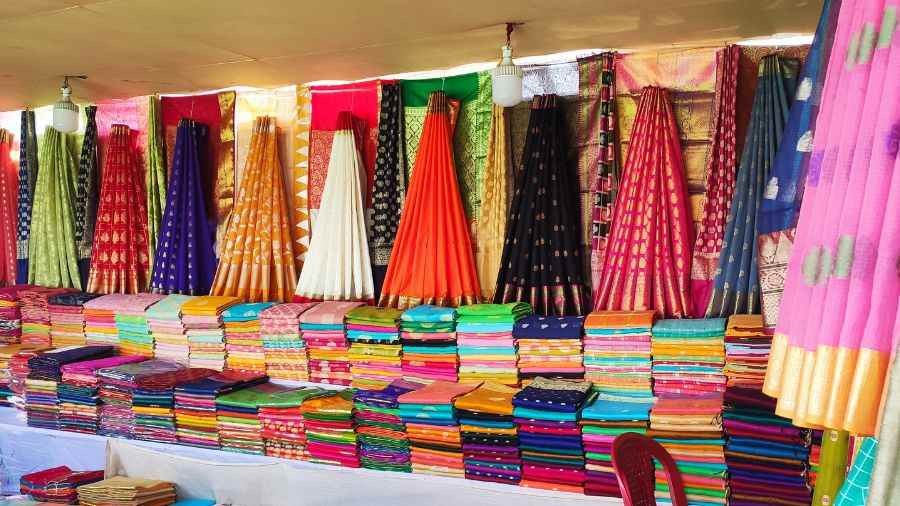Indian Textiles Industry is a Booming Sector Driving Global Trade

Image: Collected
India's textile industry is a key player in the global market, contributing significantly to economic growth and international trade. With its diverse range of garment companies, fabric manufacturers, and textile exporters, India holds a prominent position in the global textiles landscape.
The sector is a major contributor to India's economy, accounting for over 7% of the GDP and around 15% of total exports, according to data from the Ministry of Textiles. This underscores its importance in driving industrial growth and providing employment opportunities across the country.
Indian garment companies are renowned for their craftsmanship, quality, and innovation. They cater to a wide range of consumer preferences both domestically and internationally, from traditional ethnic wear to modern couture. This has established India as a significant player in the global fashion industry.
Fabric manufacturers form the backbone of India's textiles sector, supplying raw materials to garment companies and other downstream industries. With a rich heritage of textile craftsmanship, India produces a variety of fabrics, including cotton, silk, wool, and synthetic blends. The sector's adherence to quality standards and adoption of advanced manufacturing technologies have enhanced its competitiveness in the global market.
India's textile exporters play a crucial role in expanding the country's presence in international markets. Leveraging competitive pricing, superior quality, and efficient supply chain networks, Indian exporters tap into key markets across the globe. The United States, European Union, and Middle East are among the primary destinations for Indian textile exports.
Despite the industry's growth, it faces challenges such as fluctuating raw material prices, geopolitical tensions, and evolving trade policies. Additionally, the rise of sustainable fashion practices and digital disruption are reshaping the industry landscape, prompting companies to innovate and adapt to changing market demands.
To address environmental concerns, Indian textile companies are increasingly embracing sustainable practices across their operations. This includes adopting eco-friendly manufacturing processes, promoting ethical sourcing, and implementing recycling initiatives. These efforts not only contribute to environmental conservation but also enhance brand reputation and consumer trust.
The Indian government has been proactive in supporting the textiles industry through various policy interventions and incentive schemes. Initiatives such as the 'Make in India' campaign, textile parks, and export promotion policies aim to boost manufacturing capabilities, enhance competitiveness, and facilitate market access for Indian exporters.
Despite challenges posed by the COVID-19 pandemic and global economic uncertainties, the Indian textiles industry remains resilient. With a robust domestic market, skilled workforce, and favorable policy environment, the sector is well-positioned to capitalize on emerging opportunities in the global textiles market.
By fostering innovation, embracing sustainability, and leveraging digital technologies, Indian textile companies can continue to thrive and maintain their competitive edge in the years to come.
The sector is a major contributor to India's economy, accounting for over 7% of the GDP and around 15% of total exports, according to data from the Ministry of Textiles. This underscores its importance in driving industrial growth and providing employment opportunities across the country.
Indian garment companies are renowned for their craftsmanship, quality, and innovation. They cater to a wide range of consumer preferences both domestically and internationally, from traditional ethnic wear to modern couture. This has established India as a significant player in the global fashion industry.
Fabric manufacturers form the backbone of India's textiles sector, supplying raw materials to garment companies and other downstream industries. With a rich heritage of textile craftsmanship, India produces a variety of fabrics, including cotton, silk, wool, and synthetic blends. The sector's adherence to quality standards and adoption of advanced manufacturing technologies have enhanced its competitiveness in the global market.
India's textile exporters play a crucial role in expanding the country's presence in international markets. Leveraging competitive pricing, superior quality, and efficient supply chain networks, Indian exporters tap into key markets across the globe. The United States, European Union, and Middle East are among the primary destinations for Indian textile exports.
Despite the industry's growth, it faces challenges such as fluctuating raw material prices, geopolitical tensions, and evolving trade policies. Additionally, the rise of sustainable fashion practices and digital disruption are reshaping the industry landscape, prompting companies to innovate and adapt to changing market demands.
To address environmental concerns, Indian textile companies are increasingly embracing sustainable practices across their operations. This includes adopting eco-friendly manufacturing processes, promoting ethical sourcing, and implementing recycling initiatives. These efforts not only contribute to environmental conservation but also enhance brand reputation and consumer trust.
The Indian government has been proactive in supporting the textiles industry through various policy interventions and incentive schemes. Initiatives such as the 'Make in India' campaign, textile parks, and export promotion policies aim to boost manufacturing capabilities, enhance competitiveness, and facilitate market access for Indian exporters.
Despite challenges posed by the COVID-19 pandemic and global economic uncertainties, the Indian textiles industry remains resilient. With a robust domestic market, skilled workforce, and favorable policy environment, the sector is well-positioned to capitalize on emerging opportunities in the global textiles market.
By fostering innovation, embracing sustainability, and leveraging digital technologies, Indian textile companies can continue to thrive and maintain their competitive edge in the years to come.
Previous Story
- Global Woven Fabric Market Surges with Industry Trends...
- A Comprehensive Analysis of Industrial Air Conditioning and...
- New Planes Every Week For a Decade -...
- Unlocking Opportunities - Industrial Minerals Propelling Global Business...
- Unveiling the Dynamics of Magnetic Materials in Global...
- Revolutionizing Roads - Motorcycle Manufacturers Navigate Shifting Gears...
- Surge in Outdoor Hunting Gear Resilience Amid Global...
- Sustainable Evolution - Denim Fabric Shaping the Global...